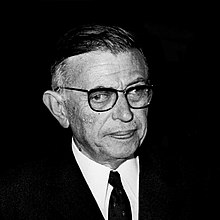Jean-Paul Sartre | |
|---|---|
 Sartre in 1967 | |
| Born | Jean-Paul Charles Aymard Sartre 21 June 1905 |
| Died | 15 April 1980 (aged 74) Paris, France |
| Education | École normale supérieure (BA, MA) |
| Partner | Simone de Beauvoir (1929–1980) |
| Awards | Nobel Prize for Literature (1964, declined) |
| Era | 20th-century philosophy |
| Region | Western philosophy |
| School | Continental philosophy, existentialism, phenomenology, existential phenomenology,[1] hermeneutics,[1] Western Marxism, anarchism, anarcho-pacifism[2] |
Main interests | Metaphysics, epistemology, ethics, consciousness, self-consciousness, literature, political philosophy, ontology |
Notable ideas | Bad faith, "existence precedes essence", nothingness, "Hell is other people", situation, transcendence of the ego ("every positional consciousness of an object is a non-positional consciousness of itself"),[3][4] Sartrean terminology |
| Signature | |
 | |

Jean-Paul Charles Aymard Sartre (/ˈsɑːrtrə/, US also /ˈsɑːrt/;[5] French: [saʁtʁ]; 21 June 1905 – 15 April 1980) was a French philosopher, playwright, novelist, screenwriter, political activist, biographer, and literary critic, considered a leading figure in 20th-century French philosophy and Marxism. Sartre was one of the key figures in the philosophy of existentialism (and phenomenology). His work has influenced sociology, critical theory, post-colonial theory, and literary studies. He was awarded the 1964 Nobel Prize in Literature despite attempting to refuse it, saying that he always declined official honors and that "a writer should not allow himself to be turned into an institution."[6]
Sartre held an open relationship with prominent feminist and fellow existentialist philosopher Simone de Beauvoir. Together, Sartre and de Beauvoir challenged the cultural and social assumptions and expectations of their upbringings, which they considered bourgeois, in both lifestyles and thought. The conflict between oppressive, spiritually destructive conformity (mauvaise foi, literally, 'bad faith') and an "authentic" way of "being" became the dominant theme of Sartre's early work, a theme embodied in his principal philosophical work Being and Nothingness (L'Être et le Néant, 1943).[7] Sartre's introduction to his philosophy is his work Existentialism Is a Humanism (L'existentialisme est un humanisme, 1946), originally presented as a lecture.
- ^ a b Cite error: The named reference
SEPwas invoked but never defined (see the help page). - ^ Critique of Dialectal Reason [1967]
- ^ Sartre, J.-P. 2004 [1937]. The Transcendence of the Ego. Trans. Andrew Brown. Routledge, p. 7.
- ^ Siewert, Charles, "Consciousness and Intentionality" Archived 2 December 2013 at the Wayback Machine, The Stanford Encyclopedia of Philosophy (Fall 2011 Edition), Edward N. Zalta (ed.).
- ^ "Dictionary.com | Meanings & Definitions of English Words". Dictionary.com. Retrieved 18 February 2024.
- ^ "Minnen, bara minnen" (ISBN 978-91-0-057140-5) from year 2000 by Lars Gyllensten. Address by Anders Österling, Member of the Swedish Academy. Retrieved 4 February 2012.
- ^ McCloskey, Deirdre N. (2006). The Bourgeois Virtues: Ethics for an Age of Commerce. University of Chicago Press. p. 297. ISBN 978-0-226-55663-5.